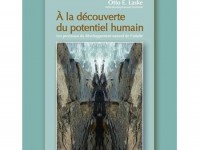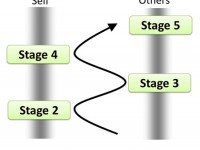This article, originally published in 1999 but still very timely today, introduces a way of deepening cognitive-behavioral, psycho-dynamic, and other behavioral approaches to coaching and HR resources management. It proposes an epistemological model that focuses on adults' frame of reference (world view), the true determinant of human behavior, which has been practiced and taught internationally at the Interdevelopmental Institute (IDM) since 2000. The approach focuses on adults speech behavior as a dimension revealing their developmental profile both social-emotionally (with regard to meaning making) and cognitively (with regard to sense making or *thinking*). The paradigm and the model are developmental in a twofold sense, that of “ontic” development occurring in human organisms as the mature over their lifetime (“nature”), and of “agentic” development brought about by humans (“nurture”). An introduction to the model is presented, followed by the topology of the mental space of coaching, a summary, and suggested topics for future research. Source: Consulting Psychology Journal 51.3, pp. 139-159 CPJ #1, 1999 Read More...
Tag: Developmental Assessment
The Constructive Developmental Framework (CDF) as a Talent Finder and Work Design Methodology
In this short article, I highlight the resources of the Constructive Developmental Framework for finding organizational talent and designing a work environment that supports its further growth. CDF as a Talent Finder and Work Design Methodology Read More...
Dialectical Thinking as a Culture Transformation Instrument for Organizations.
In this new book (to appear in 2016), addressed to CEO's, board members, and members of executive teams, Otto Laske takes an in-depth look at his Constructive Developmental Framework as a culture transformation instrument. The book focuses on organizational discourse culture as the lever by which fundamental changes come about when engaging with new forms of one-on-one and peer-listening once these are grounded in systemic dialectical thinking and an ability to "read" social-emotional meaning making in company discourse. In the tradition of consulting work based on CDF, culture transformation effects transpire in all areas of crucial important for company flourishing and breakthroughs: level of innovation, strategy design, talent management, peer-to-peer interactions in groups and teams, and the definition of new business models. The book delivers insight into the human operating system supporting holocracy. While "active listening" has been much emphasized in coaching, hosting, and DoJo4Life work, structured listening in terms of CDF is not only active but DEEP. It is deep because it is focused on joining two aspects implicit in every communication: the level of speakers' social-emotional meaning making, and the level of making cognitive sense of the world and handling its complexity. As shown in the book, both... Read More...
CDF Works on Many Levels
In this short post, I want to draw attention to the fact that what we call CDF -- short for Constructive Developmental Framework (see Wiki) -- is a multilevel methodology, not only a methodology comprising three interrelated modules. What I mean by that is that a CDF user can use this methodology on at least four levels if not more: 1. The real-time interviewing and assessment level 2. The scoring, interpretation, and feedback level 3. The role design level 4. The human-capital level where CDF is a decision theory, both practical and teachable, regarding what is the requisite match between contributors' developmental profile (size of person) and their accountability level (size of role). Up to now, CDF has mainly been taught at the first two levels, under the label of "case studies". These are focused on individual contributors and team members. Jan De Visch has developed theories about the role design level, spelled out in his two books, especially in "Minds Creating Value" (2014, see www.connecttransform.be). I find level 1 highly important because at this level CDF functions in real-time, and what it un-earthes through interviews are DTF generative mechanisms creating movements-in- thought. This is the level of dialog, and... Read More...
Socio-Emotional Development
The essence of the socio-emotional dimension has to do with how adults differ in making meaning of their life and work experiences based on their opposing and intertwined needs of being autonomous and being included in a community of others. These two lifelong tendencies achieve a different balance at every developmental “stage”. Social-emotional differences between people manifest not only in their “thinking”, but since thinking precedes acting, also in their goal setting, decision making, and, most directly, in the relationships individuals develop with others. In this life-changing course, students learn in depth not only the theory of social-emotional meaning making as developed by the Kohlberg School at Harvard, but acquire the practical skills of using what they learn, whether in making cogent assessments, giving cogent feedback, coaching, or consulting. Read More...
Case Study I (a): Practicum in Social-Emotional Thinking and Listening
This course is focused on a single-client case study. It leads participants from merely talking about levels of meaning making to interactively determining them through semi-structured interview with a chosen client, and to documenting the client’s present meaning making based on 15 structurally relevant interview fragments. The program offers students the opportunity to show themselves and others that they have not only mastered “developmental theory”, but also know how to use it in practice. For the student, writing a case study involves: Completing a 1-hr semi-structured social-emotional interview Transcribing the interview(s) into English for discussion in the study cohort Selecting 15 structurally relevant fragments of the interview conducted Evaluating a Need/Press Questionnaire (guided by the instructor) Based on fragments of the social-emotional interview, presenting in class a coding sheet showing how the interview fragments are to be evaluated, for discussion in the study cohort At the end of the course, gathering and submitting all pertinent materials making up the case study to the Director of Education for personal feedback on scoring and focusing of client feedback. Read more Read More...

